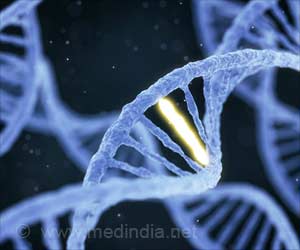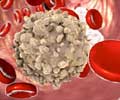For treating cancers having mutation in the BRAF gene, combination of RAF inhibitors and MEK inhibitor can effectively block MAPK pathway.

‘For treating cancers having mutation in the BRAF gene, combination of RAF inhibitors and MEK inhibitor can effectively block MAPK pathway. This combination can be used for the treatment of melanoma, lung, pancreatic, and colon cancer.’
Read More..




A new combination therapy is developed that suppresses the MAPK pathway. The combination of two small molecules can treat not only BRAF mutated melanoma but also other aggressive types of cancers like melanoma, lung, pancreatic and colon cancer in which the mutations in cancer genes are called RAS or NF1.Read More..
According to the preclinical study, a second-generation RAF inhibitor type II in combination with the standard MEK inhibitor can be effective in treating cancers with these mutations. It can also be used to overcome the resistance acquired to the current standard treatment for treating BRAF mutations.
Senior author Roger Lo, MD, PhD, a professor of medicine at the David Geffen School of Medicine at UCLA and member of the UCLA Jonsson Comprehensive Cancer Center, said “The idea behind this study was to develop a combination treatment that helps people with common lethal cancers by eliciting durable anti-tumor responses. Right now, MEK inhibitors by themselves provide limited clinical benefits, and the current MAPK pathway-targeted, combination therapy can help only certain patients with cancers harboring specific BRAF mutations.”
Using patient-derived models of melanoma, non-small cell lung cancer, pancreatic cancer and colon cancer as well as mouse tumors that mimic these human cancer, the effectiveness of the combination was tested by the researchers.
The impact of RAF inhibitors plus MEK inhibitors on the MAPK pathway in the cancer cells and on cancer fighting cells called T cells was evaluated over time to achieve long-term response.
Advertisement
Advertisement
Co-senior author Gatien Moriceau, PhD, assistant adjunct professor at the David Geffen School of Medicine at UCLA said, “It is quite remarkable that two drugs were able to bind to each of two proteins and sequester them from further propagating signals inside the cancer cells. The combination unexpectedly preserves killer T-cells inside the tumors, which allows them to hunt down drug-resistant tumor clones. This favorable impact on T-cells paves the way to combine MAPK-targeted therapies with anti-PD-1/L1 immune checkpoint therapy.”
Currently the combination of type II RAF inhibitors plus MEK inhibitors is being tested in clinical trials for the treatment of melanoma and other solid cancers like non-small cell lung cancer.
Source-Medindia










